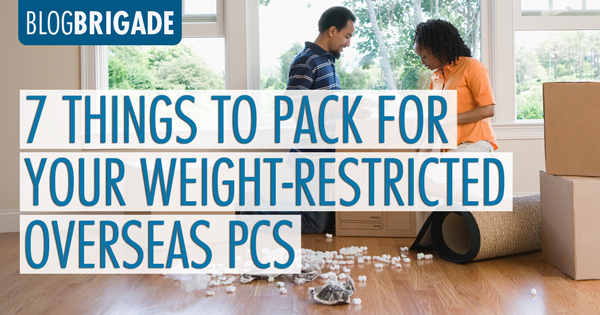

Julie
Moves happen all the time in the military community. There’s that span of time, as your neighbors are moving in, where you hold your breath waiting to see if they’ll be good neighbors (respectful, kind and friendly) or the kind that make you count the days until your next PCS. Your dog’s behaviors escalate the risks of the latter. Here are a few ways to make sure you and your four-legged fur-amily members are a welcomed addition to the neighborhood.
Avoid bad-neighbor status
When you’re are running or walking through your neighborhood and you see THAT pet owner with their uncontrolled dog on the leash coming toward you — your muscles start to clench and you sweat a bit more from that underlying fear that this time the dog will lunge and take a chunk out of your leg. Don’t be that neighbor everyone dreads passing. Here are the behaviors that give your dog (and you) a bad name:
- Pulling on leash and lunging at strangers
- Jumping on visitors
- Growling and barking at visitors
- Hiding in fear of visitors
- Barking excessively
- Stealing food from the counter or people’s plates or hands
- Behaving aggressively with other dogs
- Refusing to come when called
- Neglecting to clean up after your dog when he voids outside of your yard
- Roaming around unattended outside your yard
Choose to raise a well-mannered fur-amily member
Every family parents pets differently. There’s nothing wrong with doing things your own way, but make sure your fur babies know how to behave in a way that keeps them, other people, dogs and property safe, because it’s your responsibility. Choose to be proactive with your pet. Decide how you want to train your dog to behave. There are numerous ways to train your canine, including:
- Private classes (you and your dog with the instructor)
- Group classes (you and your dog with other pet-owner couples and an instructor)
- Camp training (dog goes away with the trainer for a few weeks and comes back trained)
- Do-it-yourself training from a book, the internet or prior knowledge
I’ve tried the do-it-yourself method from a book and it worked, but I’ve always had the best and quickest results when I attended group or private classes and practiced at home. Half of training your dog is training yourself to understand your dog (how she thinks, what motivates her, and how you become and remain a trusted pack leader). I highly recommend a training course where your dog is exposed to other dogs and people. Socialization, learning to interact well with others, is a huge part of being a good neighbor.

You can teach any dog manners
Whether your dog is a puppy, a geriatric, stubborn, or a complete klutz (I’ve had a few that chase balls right into walls, doors and fences), they are trainable. You may need to reach out to your veterinarian, a licensed dog trainer or an animal behaviorist to help you if your dog is excessively fearful or aggressive. There’s hope for all pets, they just need the right instruction and consistent practice.
After our fur-child of 14 years, Faith, died earlier this year, we decided to adopt another dog from the local shelter. After a few visits, we found our sweet Coco, a 2-year-old special, and realized we had a lot of energy on our hands. We quickly learned to take her on a walk or play fetch with her multiple times a day so she could run out her energy and curb her night crazies a bit.
We also started taking her to private lessons from a trainer, worked with her at home and then went to Canine Good Citizen training course through our veterinarian’s office. The training and test cover the basics of good behavior for dogs. Dogs that can perform the 10 skills on the test are truly a pleasure. Here are the 10 good-behavior goals for your dog:
- Accept a stranger (shows no signs of fear or aggression and not leave your side to greet them)
- Sit for petting (doesn’t move from sitting position and allows stranger to pet them)
- Tolerate grooming (lets stranger groom and touch paws, tail, ears)
- Walk on loose leash (no pulling, is attentive to owner and follows where they lead)
- Walk through a crowd (no pulling on leash, no signs of fear or aggression while following owner)
- Stay in sit or down position (remains in stay when owner walks 20 feet away and back)
- Come when called (immediately returns to owner when called)
- Be polite around dogs (shows casual interest in other dogs walking by, no pulling toward them)
- Remain confident when distracted (shows confidence, not panic with loud sounds or visual distractions)
- Stay calm when separated (can be left with another person for brief time and maintains manners)
Sometimes we get so busy with work and life that we forget to get involved with our animals beyond the couch cuddles and feeding time. Invest in your dog as you do your children. OK. So maybe your dog doesn’t need tap dance or soccer lessons, but remember that your dog needs some interaction and a purpose or job to do each day too. You can do obedience training, teach your dog tricks or jobs around the house, train for agility trials, practice fetch with Frisbees, learn therapy dog skills or just go on daily walks. Your dog will love every moment of that time with you, and you and your dog will earn a welcomed spot in the neighborhood.













